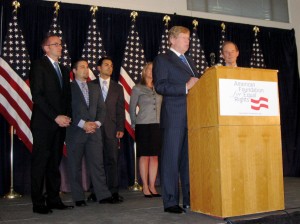
Some terrific journalists covered the federal Prop 8 trial and have provided a nice mosaic of reporting on Wednesday’s historic closing arguments in Judge Vaughn Walker’s San Francisco courtroom. The American Foundation for Equal Rights posted the entire trial transcript on their website during which you can read how Ted Olson, arguing for plaintiffs Jeff Zarrillo and Paul Katami and Sandy Stier and Kris Perry, passionately summed up why same sex couples deserve marriage equality.
With hard news reporters summing up the remarkable closing arguments – I found that there were other unnoticed or underreported stories that also contribute to the record of this remarkable time, including how the elections this November could dramatically impact the outcome of the trial. The National Organization for Marriage’s Maggie Gallagher told me, for instance, that she thinks Walker may rule that Prop 8 discriminates based on gender as well as sexual orientation. I was also amused to see that NOM posted video of Ted Olson’s moving answer to a question I asked at the news conference on their NOM blog.
News highlights from the closing arguments
But first for some background – may I direct your attention to a piece by the outstanding LGBT reporter Lisa Keen, who covered the entire trial. Keen, co-author with famed attorney Suzanne Goldberg of a book about the Colorado Amendment 2 case, framed the way Prop 8 proponent Charles Cooper and plaintiffs’ attorney Ted Olson argued their closings in Prop 8 closing: Fear v. Equality. Cooper essentially reiterated what Protect Marriage/Yes on 8 used so persuasively with voters in 2008 – that there could be “profound” changes to the institution of marriage is same sex marriage is legalized. “It could portend some social consequences that would not be good ones,” said Cooper. But no one knows so the voters of California opted not to try something so risky.
Keen notes Olson’s response, with U.S. Supreme Court citations to back him up:
“They just don’t know,” said Olson of supporters of Proposition 8. “That is the essence of their case as it comes to the end of the trial and the closing arguments. They just don’t know whether same-sex marriage will harm the institution of heterosexual marriage, and I submit the overwhelming evidence in this case proves that we do know. And the fact is allowing [same-sex marriage] will not deter heterosexuals from marrying or staying married or from having babies…[but] strengthens the institution of marriage for heterosexual and homosexual persons and their children.”
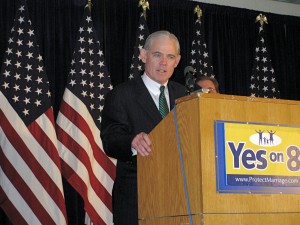
Howard Mintz from the Mercury News does a great job of summing up Walker’s discomfort with the lack of evidence Cooper presented at trial. Cooper said that procreation-based marriage is “fundamental to the survival of the human race. Without the marital relationship, society would come to an end.” But, Walker noted, Cooper’s one witness, David Blankenhorn, didn’t testify about procreation so “What testimony in this case supports the proposition?” Cooper answered: “You don’t have to have evidence of this.”
Mintz reported how Cooper explained that the main purpose of marriage between a man and a woman
is procreation and “channeling” the sexual behavior of heterosexuals into “stable, marital unions….Procreative sexual relations both are an enormous benefit to society and represent a very real threat to society’s interest.”
Walker: “Threat?”
Cooper: “If children are born into the world without this stable, marital union … both of the parents that brought them into the world, then a host of very important, very negative social implications arise…. The purpose of marriage is to provide society’s approval to that sexual relationship and to the actual production of children.”
Walker: “But the state doesn’t withhold marriage from people who cannot have children.”
Cooper: “It does not.”
Walker: “Are you saying the state should?”
What was not so focused on in the media recounting of the arguments was Olson’s discussion of how children were used as a virtual weapon by the Yes on 8 campaign, and then abandoned at trial. Olson said:
“It is revealing, it seems to me, that the deinstitutionalization message [from Prop 8 proponent expert David Blankenhorn] is quite different from the thrust of the proponents’ Yes on 8 election campaign. That, in the words they put into the hands of all California voters, focused heavily on: Protect our children from somehow learning that gay marriage is okay. Protect our children from learning that gay marriage is okay.
Those are the words that the proponents put in the ballot — in the voter information guide that was given to every voter.
That was not a very subtle theme that there is something wrong, sinister or unusual about gays, that gays and their relationship are not okay, and decidedly not suitable for children, but that children might think it was okay if they learned about gays getting married like normal people.
For obvious reasons [the plaintiffs’ argument that Prop 8 is discriminatory and causes them harm], the “gays are not okay” message was largely abandoned during the trial in favor of the procreation and deinstitutionalization themes.”
Legal scholar Nan Hunter notes on her blog Hunter of Justice that research shows that society is increasingly moving away from child-centered marriages to adult-centered marriages.
The City of San Francisco weighs in
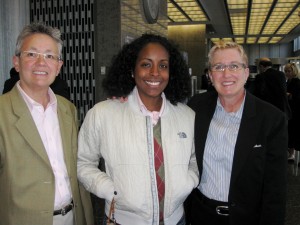
Chief Deputy City Attorney Terry Stewart, right, with wife Carole Scagnetti of MEUSA and daughter Natasha Paynes
One significant but somewhat overlooked exchange between Walker and Therese Stewart, the chief deputy city attorney of the city of San Francisco, which joined the plaintiffs in the case, was whether the city would forge ahead with an appeal if Walker ruled against the plaintiffs.
Stewart, whose wife and daughter were in the courtroom, argued that the city had a lot at stake since Prop 8 promotes discrimination, which in turn leads to higher health and welfare costs (from hate crimes to psychological trauma) for which the city bears the burden. Additionally, in an amusing exchange, Stewart discussed the economic impact from the loss of tourism since the city has “long been the city of love, where people leave their hearts,” referring to the famous Tony Bennett song “I Left My Heart in San Francisco.”
Walker is expected to issue his ruling in July and whoever loses is expected to appeal. If Walker rules in favor of the plaintiffs, Cooper and Protect Marriage are expected to ask for an immediate injunction against lifting the ban on same sex marriages until the case is decided.
The complication with the Ninth Circuit
There is a popular misconception that the Ninth U.S. Circuit Court of Appeals in San Francisco is liberal. In fact, it is more of a mixed court that could consider the case in the context of national court rulings on marriage – which is not a good thing for the plaintiffs.
Consider, for instance, that the presumably liberal high court of the state of New York ruled 4-2 in July 2006 against marriage equality – based on some of the same reasons argued by Cooper. Judge Robert S. Smith wrote in his 22-page majority opinion that, “Plaintiffs have not persuaded us that this long-accepted restriction is a wholly irrational one, based solely on ignorance and prejudice against homosexuals,” a bias that is not like anti-miscegenation laws based on racism. Smith also wrote:
“Despite the advances of science, it remains true that the vast majority of children are born as a result of a sexual relationship between a man and a woman. Intuition and experience suggest that a child benefits from having before his or her eyes, every day, living models of what both a man and a woman are like.”
So while there was much giggling, laughter and eye-rolling when Cooper sputtered on about procreation – that doesn’t mean judges in the Ninth Circuit and justices at the U.S. Supreme Court might not buy what seems to Olson/Boies and most gays as an out-of-date argument. This is one of the reasons why so many LGBT legal advocates and others (John Dean, for instance) thought the federal Prop 8 constitutional challenge was “too risky” at this time.
Maggie Gallagher’s insights and NOM’s posts
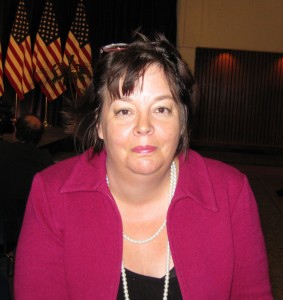
The National Organization for Marriage’s Maggie Gallagher, who was live-blogging during the trial – and actually got called out for putting her bare feet up on the railing – also thinks their arguments will be more persuasive to the Supreme Court than to Walker.
Exhibiting an almost embarrassed girlish sense of humor when I introduced myself, Gallagher told me:
“I have negative celebrity. Only the people who don’t like me know who I am. I think Chuck Cooper did a great job in a difficult situation. I think Judge Walker telegraphed very clearly two things: one, he believers there is a fundamental right to same sex marriage, and less clearly – but I would lay my bets that he is going to find that Prop 8 is gender discrimination, as well. So we were not optimistic going into these arguments with this judge and I’m not particularly optimistic coming out.
We all know that this is going to end up in the Supreme Court so a lot of what happened today was aimed at Justice Kennedy, not Judge Walker.”
Protect Marriage Ron Prentice and attorney Charles Cooper
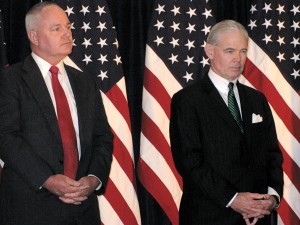
Most people watching the trial might disagree with Gallagher’s confident description of Cooper’s performance. Indeed, he seemed so distracted and flustered – at one point literally putting his hand up to his head in a reality TV version of a 1950s melodrama – that Walker asked him if he needed to take a five minute recess. But during the Protect Marriage news conference, Cooper was short, heard to hear and left after he said:
“The closing argument was extraordinary in its length and its depth. The central and overriding question – the issue before the court was before the people of California – to be decided in his courtroom by him or if an issue like this should be decided by the people themselves. Whether the judgment of the majority of Californians – some 14 million- plus making themselves heard on this issue – whether that judgment to be trumped in court. Obviously, it’s been our position from the beginning that the constitution does not require that.”
Cooper introduced Protect Marriage’s Ron Prentice and then left before any of us could say, “Huh?”
I might also note that NOM has posted the section of the news conference during which Ted Olson responded to a question I asked about why he got so passionate in presenting his closing arguments. See NOM’s blog here: www.prop8case.com.
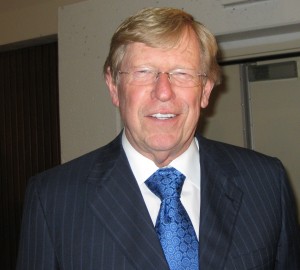
Ted Olson on getting passionate
At the first news conference in May 27, 2009 when Olson was first introduced as part of the new lead legal team, I asked him why the gay community should trust him, given his conservative credentials. At Wednesday’s news conference, I asked Olson what he was thinking when he became so passionate, so emotional at moments during his closing – was he experiencing the burden of trust not only the plaintiffs but the gay community had placed in him?
Olson said:
“You sensed how emotional I felt and passion is a good word for how I felt throughout this trial. There may have been a couple of moments in there where I had more emotion running through my mind and body than another but I felt that way all day. I felt that about this case and I do think all the time of Jeff and Paul and Sandy and Kris – what they’ve said in their testimony, what their family relationship is and part of their family was there today. And I need to be able to convey that emotion as well as those facts to the law, to the judge. That is our job – to try to give life to the arguments our clients could make if they could make them, if they were lawyers.
But more than that because I’m somewhat separate – I need to be able to feel it in order to be able to say it as passionately as I can. You don’t want to be maudlin or anything like that – in a trial. This is partially a very academic exercise – we’re talking about the law.
But we’re talking about human lives here and discrimination. I think about the history of discrimination in this country. And it’s important to understand this discrimination in the context of that discrimination, historically. It’s different each time but it’s still same – excluding people on the wrong basis. So I was trying to convey that.”
(See separate story for an interview Ted Johnson and I did with David Boies on this, to be posted Saturday.)
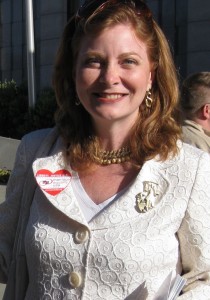
Reaction
Afterwards, I asked Marriage Equality USA’s Molly McKay if Olson had earned and won that trust. She said:
“He was awesome. It was fantastic. He truly put this case and framed it exactly in the American civil historical context. I can’t imagine a better and more articulated argument. It reminded me of the hero we found in [San Francisco Mayor] Gavin Newsom when, after 32 days in office – we didn’t know who he was – he stood up for us like the big brother we always wished we had and allowed us to get married. And today, Ted Olson is that same straight ally hero.
He absolutely earned that trust and I think it also shows a lesson to the gay community that we need to be open as to who our allies are in the world and that we really need to not be limiting at all – because we have allies everywhere – really powerful people ready to help us. We don’t have to do this by ourselves, nor should we. This is an American moment. This is our generation’s opportunity to participate in the moving forward of our civil rights history. And look at that – on the opposite aisle of the political spectrum together for the American principle of equality.”

Lance Black and Cleve Jones
Cleve Jones, who is on the AFER board, said:
“I was very moved and I was kind of surprised at what a poor job our opponents did. The message to the community needs to be right now that this case moving forward to the U.S. Supreme Court is the single most important thing we are doing. And in my opinion, everybody should drop everything else to get behind AFER and raise the money necessary to move this forward.
There is no better opportunity for our people to advance. It’s a real challenge for us because we are not known for our attention span, nor are we known for our solidarity or discipline. And we need that. We need to pay attention. And it will be a challenge because we have many months now to wait – potentially a couple of years as it winds its way to the Supreme Court. I believe that decision will change everything for LGBT America forever.”
Dustin Lance Black, who is also on the AFER board, had this moving reaction:
“What was so important for me today – something that Cleve and I have been fighting about for a long time and I made a promise on a very big stage about a year and a half ago at the Oscars that kids out there would one day soon be able to enjoy their federal equality. And it was amazing today to hear those federal constitutional arguments being made for the first time regarding relationship recognitions. It feels like the first piece of that promise was fulfilled – regardless of outcome – the first piece of that promise was fulfilled.”
The Political Context
Barely mentioned in coverage of the closing arguments was the extremely important political context in which these arguments are being decided.
This November, Attorney General Jerry Brown – who refused to defend Prop 8 in court because he believes it’s unconstitutional – is running for governor. It is likely that if elected, he will continue to refuse to defend Prop 8 in court – just as Gov. Arnold Schwarzenegger has done. However, if Brown’s Republican challenger Meg Whitman is elected, the case might change. Whitman voted for Prop 8 and will likely order that it be defended in the Ninth Circuit, joining Cooper and the Protect Marriage group.
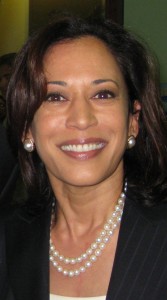
Additionally – San Francisco District Attorney Kamala Harris, who is running to be Attorney General – says that she, like Brown, would refuse to defend Prop 8 in court. However, her opponent, Los Angeles District Attorney Steve Cooley said he would defend Prop 8 in court.
One other note about the Attorney General’s race: the AG is responsible for writing the ballot title and summary. Brown chose not to accept wording submitted by Protect Marriage for the Prop 8 initiative, for instance, and titled it: “Eliminates Rights of Same-Sex Couples to Marry. Initiative Constitutional Amendment.” If the Ninth Circuit rules next year and if the U.S. Supreme Court accepts the case and issues its ruling in 2012 – that could be at the same time as a proposed repeal Prop 8 goes on the California ballot for that election year. The high court could either decide narrowly on the constitutionality of Prop 8 in California or it could rule – either way – on the fundamental right of same-sex couples to marry.
NOM is already gearing up for the election fight in November. It is imperative that those working for marriage equality and to defeat Prop 8 get into gear, too.

